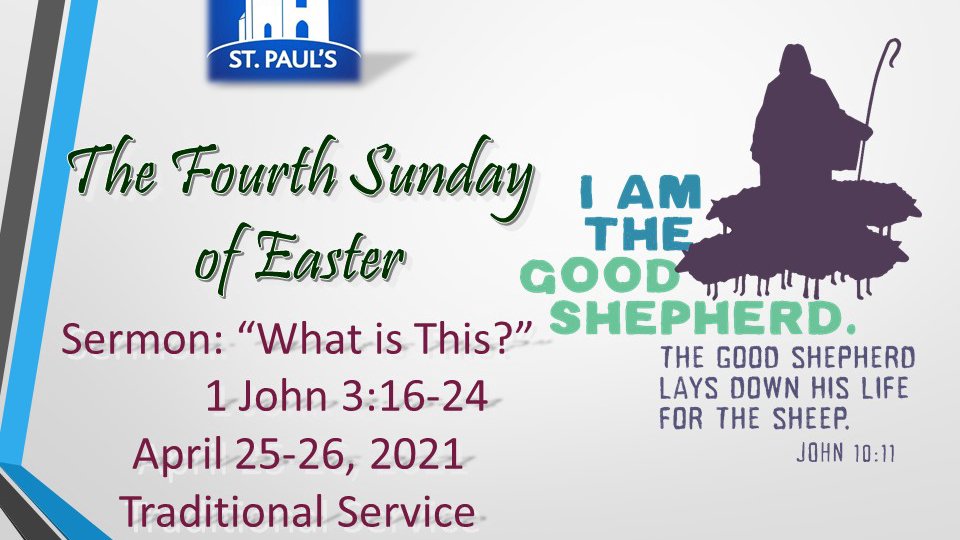We hear so many mixed messages of what love is. Popular songs from the past decades or even more contemporary ones tell of what love can and should be; poems, memes, and other influences also are commonly read and seen; even our own emotions and feelings strive to tell us what love is and should feel like. Despite all these mixed messages, our Lord tells us how we are to know real and perfect love. In our Epistle we hear, “By this we know love, that Jesus laid down His life for us” (1 John 3:16). Today, we focus on the fact that as our Good Shepherd, Jesus has laid down His life for His sheep. By that sacrifice on the cross and Easter victory, we can rejoice in a perfect love that lasts and an unconditional love that forgives as our Good Shepherd continues to guide, lead, and direct us through all our days.

04/25/21 Traditional Service
What is This?” 1 John 3:16-24
April 25, 2021 • Rev. Kenny Hsu
04/14/24 Praise Service
April 14, 2024
AS WE GATHER “Amazing” is a commonly used word in the English that has a rich history. It came into common usage in the 14th century as a variant of the older root word “amasod,” which meant stupefied or confounded or overwhelmed with sudden surprise or wonder. The word “amazing” shows up several times in hymns that we sing—from describing the action of God in the birth of Jesus as “love amazing” (LSB 375:1) to bringing to our hearts and minds that in His suffering to pay the price of our sins, our Lord showed “amazing pity” (LSB 437:2). Two other hymns refer to the “amazing grace” of God (LSB 744:1; 558:2), and in another hymn, the author of the text rejoices that God “has done amazing things to me” (LSB 934:2). The season of Easter is a time for us to be truly amazed and filled with the praise of our amazing Lord!
04/14/24 traditional Service
April 14, 2024
AS WE GATHER “Amazing” is a commonly used word in the English that has a rich history. It came into common usage in the 14th century as a variant of the older root word “amasod,” which meant stupefied or confounded or overwhelmed with sudden surprise or wonder. The word “amazing” shows up several times in hymns that we sing—from describing the action of God in the birth of Jesus as “love amazing” (LSB 375:1) to bringing to our hearts and minds that in His suffering to pay the price of our sins, our Lord showed “amazing pity” (LSB 437:2). Two other hymns refer to the “amazing grace” of God (LSB 744:1; 558:2), and in another hymn, the author of the text rejoices that God “has done amazing things to me” (LSB 934:2). The season of Easter is a time for us to be truly amazed and filled with the praise of our amazing Lord!
04/07/24 Traditional Service
April 7, 2024
AS WE GATHER When Thomas finally met Jesus, alive again after Easter, he went from demanding proof to a personal confession of faith, “My Lord and my God.” It would have been a different story had the news been false. The rest of the Jerusalem congregation truly exhibited Easter faith when they became a welcoming community, one that shared with newcomers whatever they needed. The news was unbelievable, but so were the responses—in word and deed as faith saw the freeing truth: we need fear nothing, not even death. We have heard the news as well. How shall we respond?





